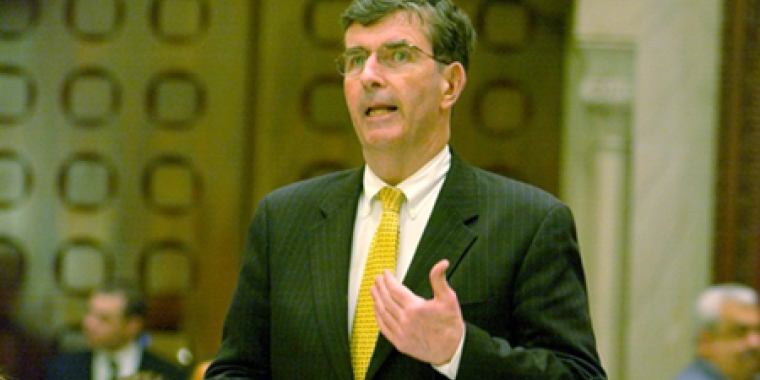
Has A New Era Dawned In Albany?

Last year the state Legislature passed an on-time budget for the first time in over 20 years. In fact, it was the first on-time budget in a generation. After 21 years of bitter partisanship and government dysfunction, the Governor and Legislative leaders were finally able to come together to meet the budget deadline.
But last year’s success put enormous political pressure on the Governor and Legislative leaders to reform the budget process and continue to deliver on-time budgets for New Yorkers. As this column is being written, I am pleased to report that the Senate and Assembly have begun passing budget bills for the 2006-07 state budget. For the second year in a row, Albany is poised to pass an on-time budget.
As RankingMinority on the Senate Finance Committee, it is very satisfying to see a fair, on-time budget passed that will benefit all New Yorkers. You should know that hundreds of dedicated professionals, from the Executive, Senate and Assembly staffs, have been working night and day for weeks to write a state budget that is literally thousands of pages long.
There is an old adage that says there are two things you never want to see being made -- sausage and laws. But the truth is, being part of a budget process that provides essential services and programs for millions of New Yorkers is truly an honor. It is also a huge responsibility. New York’s $112.4 billion budget is second only to California’s and larger than the budgets of most countries in the world. It provides funding for every public school in New York, manages the largest Medicaid program in the country, writes the state’s tax policy and economic development, supports our world-class universities and colleges, and funds hundreds of programs ranging from tourism to agriculture. Yet, I am often dismayed that in such a large spending plan that some worthwhile programs don’t receive appropriate funding.
Like most successful reform movements, the impetus to pass an on-time budget was driven by widespread public support. I was elected to the Senate ten years ago on a reform platform and have been working with my colleagues on both sides of the aisle to make our state government more transparent and responsive to the people. I have always said that our first responsibility as legislators was to pass a fair and timely budget. After all, if the Legislature could not succeed in its single most important constitutional responsibility -- meeting an April 1 deadline to pass a state budget -- then what hope did it have in tackling other major reform issues, such as Medicaid, public authority and campaign finance.
I shared the frustration felt by my constituents in Albany County who saw the affects of late budgets year after year. I listened to the concerns of school administrators who were forced to send out tax bills based on estimated education funding from the state. School districts were put in the impossible position of either raising taxes or cutting services because the state could not in good faith give them an exact amount of their state education aid. I would argue that it was unfair for property taxpayers to be saddled with higher school taxes based on these estimates.
I know there were many school districts across the state that had to put off hiring teachers or eliminate music, sports and language programs because there was no guarantee there would be state funds to pay for them. Similarly, many school districts had to hold off new construction or rebuilding projects because the leaders in Albany would be fighting over a budget well into the summer months.
Over the years I have heard from building contractors who had to lay off workers because there were no state contracts in place to start bridge and road construction projects that provide hundreds of high-paying jobs every year. I talked with many non-profits that provide critical services for those New Yorkers most in need and didn’t have the money on hand to make payroll because their grant money was being held up by the late budget. Many of these professionals would work weeks, even months, without pay because of their dedication to helping their clients.
There were even a few years during Governor Pataki’s first term when some state employees’ pay was withheld. Naturally, this had an especially harsh impact on Albany County residents and businesses.
Beyond the human costs of missing the budget deadline was the dismal credit ratings New York received year after year, driving up interest rates on state loans and costing taxpayers millions of dollars in additional interest.
It was a frustration for me and my colleagues that as a legislative body we could not put a budget in place by April 1 because all the power in Albany was concentrated in the hands of three men -- the Governor, Senate Majority Leader and Assembly Speaker. Negotiations were often held in secret among the leaders and senior staff. Rank-and-file legislators from both parties were excluded. When an agreement was finally reached, budget bills would then be dropped on our desks often in the middle of the night with little time to review and debate. It was all or nothing. There would be no public input, no chance for legislators to make their case for a particular program. It was government at its worst. Thankfully, we have seen a more open budget process in the last two years, with public leadership meetings and more participation by rank-and-file legislators.
I first sought elected office to see to it that we completely transform the legislative and government processes and put in place lasting reforms that benefit all New Yorkers. Budget reform will continue to be one of my top priorities. This year is a crucial turning point in New York’s reform movement. While I am encouraged by new openness of the budget process and the commitment for New York to meet its budget deadline, we cannot allow the hard work and successes we have achieved to stall. We cannot allow those elected officials who were pushed by you to pass reform measures to declare victory and not finish the job. Make no mistake about it, much work still needs to be done and I will keep pushing the Legislature to pass substantive reform measures before this session ends in June.
*This article ran in the Spotlight Newspapers April 5, 2006.
